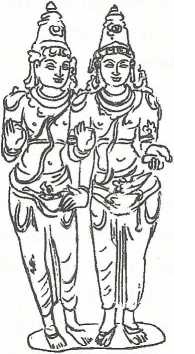By Swami Harshananda
Aśvins literally means ‘related to the horses’.
History of Aśvins[edit]
They are twin-deities that are given an important place in the Rigveda. At least 50 suktas are in praise of them. They are always described and eulogized together. They are the twin sons of Surya (the Sun-god) and his spouse Samjñā. When they assume the horse-form, they are described as ‘Aśvinau,’ or Aśvīni-kumāras (aśva = horse).
Powers of Aśvins[edit]
It is rather difficult to say aspect of the powers of nature they represent. Scholars are divided on whether they represent
- night and day,
- earth and sky, or
- moon and sun.
There is also one view that they were originally two kings who were gradually elevated to godhood. They are pictured as semi-darkness before dawn. They pervade this world with moisture and light. They are eternally young and handsome. In fact, they are the youngest of deva-s.
Attributes of Aśvins[edit]
Their chief characteristic is that they are continuously striving to do good to others. They are expert physicians and surgeons. They know the arts of healing, rejuvenation and even plastic surgery. When supplicated, they grant children, food, wealth, health and protection from enemies. Hence they are invariably invoked during the Vedic sacrifices.
Their many exploits like granting youth to the old sage Cyavana, sight to the young Upamanyu who had lost his eyesight, children to Mādrī, the younger queen of Pāṇḍu are also described in the Puraṇas and Mahabharata. Tradition recognizes them as important teachers of Ayurveda, the science of health and longevity.
References[edit]
- The Concise Encyclopedia of Hinduism, Swami Harshananda, Ram Krishna Math, Bangalore

